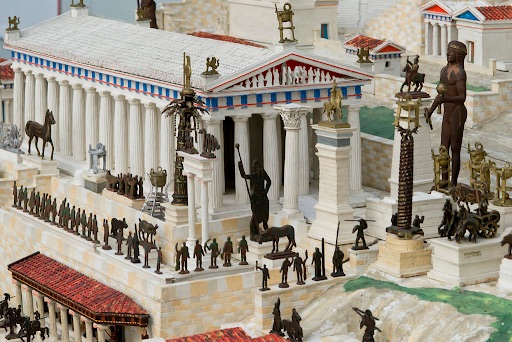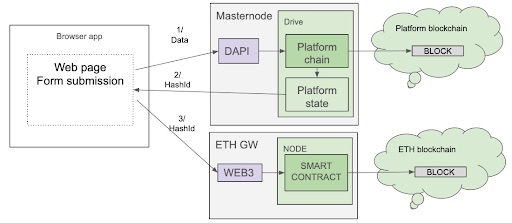How Oracles can unlock new possibilities for Dash Platform
27 Jan 2021 - Felix Mago

The Blockchain revolution is pushing forward a world of trustless applications. We now can automate business logic in smart contracts and store data in a trustless manner, e.g., on Dash’s decentralized cloud storage. Oracles have become increasingly important in this context because they allow smart contracts to interact with and trust external data. In that sense, oracles are a required connector and essential building block that enable the use of Dash’s decentralized storage in trustless setups. This article explores how Dash Platform can profit from the use of oracles and vice versa.
The importance of decentralized Oracles
Just imagine having a fully automated bank or trading account that doesn’t require a bank or financial institution. This dream is already possible. Decentralized apps (dApps) through smart contracts remove intermediaries, human interaction and significantly increase process efficiency. Storage and oracles are two essential building blocks in such setups as they allow dApps and smart contracts to interact with the outside world by processing and storing information. This can be done through centralized entities or by relying on decentralized sources.
But here is the issue: you don’t want to trust centralized entities that severely limit the true potential of decentralized applications. Instead, you want a proper way to store data decentrally and interact with it as you like. This can be achieved through a smart contract that follows a set of rules and decentralized cloud storage that doesn’t rely on centralized servers. Yet, one piece is missing here, and that is the connection between where the data is stored and how applications execute on that data, or in other words, how the smart contract interacts with external data. Here is where oracles come in.
An oracle is a third-party entity that validates information about the state of the outside world. For example, oracles can report the prices of assets from trusted sources or the winner of a particular sports event. This information may be retrieved or aggregated from a single source using a centralized oracle or multiple trusted sources using a decentralized oracle.
Allowing smart contracts to interact with off-chain data can increase use cases exponentially for dApps because almost every scenario you can think of requires external information, meaning data must be stored and processed. However, most smart contracts don’t have the means to verify the accuracy of all external inputs. The obvious solution is a reliable source of truth that can feed accurate data into permanent blockchain ledgers, which in turn enable smart contracts to execute their logic.
Decentralized oracles can solve this challenge and introduce a plethora of new possibilities for Dash Platform.
How oracles add value to Dash Platform
Dash’s decentralized cloud storage takes advantage of the Dash Masternode network and blockchain by transforming its peer-to-peer network into a decentralized cloud. Developers can now easily integrate their applications with Dash Platform using Dash’s decentralized application programming interface (DAPI). This provides many new opportunities for building dApps.
Through Dash Platform, everyone can now send, store, and retrieve data via Dash Drive, decentralized cloud storage, and navigate the blockchain through a more developer-friendly interface. One key feature of DAPI is that it allows developers to have the same access and security without the cost and maintenance overhead, and for users to access their dApps from any device or web browser without a 3rd party. No one can, in other words, censor a dApp or its data, and users don’t need to install anything.
To truly unlock the benefits of Dash Platform, we plan to have a decentralized oracle that acts as a source of truth and enables data exchange between Ethereum and the Dash Blockchain. Put briefly, we can use oracles to communicate between Dash Platform, DAPI, and the Ethereum blockchain through smart contracts in a trustless environment.

A new world of decentralized applications
Trustless setups are rather complicated, and we haven’t seen many examples of running use cases yet. Most dApps and other applications are using external data from somewhat centralized sources. This situation is changing as blockchain matures and expands into more and more industries. The more decentralized data sources are available, the more people can create their ideas, use, build, replicate or leverage existing data.
With the rise of decentralized exchanges and DeFi applications, price feeds on cryptocurrencies are a good example. They are an essential data reference for all these dApps to interact with and to enable transactions followed by more transactions. Accuracy is critical here, and there are different strategies to ensure data integrity: using multiple data sources, various oracles by putting skin in the game or using trusted environments. In other words: trustable data that enables process automation and efficiency are the key for dApps.
Other examples are IoT sensors that improve logistics processes or insurances that automate claims and settlements or prediction markets that allow betting on any events such as the result of a presidential election. But in all these examples to be really really trustless, the smart contract itself needs to communicate with and reference external data sources.
To not reinvent the wheel that requires building an oracle from scratch, we instead explore leveraging existing oracles and concepts. Dash has already identified Chainlink’s decentralized API as a suitable option for Ethereum Blockchain dApps to read and write data from Dash’s decentralized cloud storage. It is well known, tested and frequently used by other projects, and highly decentralized. Alternative oracle solutions are being explored.
Conclusion
Oracles play a significant role in the success of feeding real-world data to decentralized applications. For Dash Platform, the integration of a reliable oracle can unlock considerable opportunities in DeFi, cloud storage, and wrapped assets, to name a few. This means more cost-effective and practical solutions for dApps, opening new possibilities for Dash Platform. But while oracles are a required building block to build dApps that are using smart contracts and Dash’s storage to interact with each other, it is the use cases that prove potential on a technical level and from a business perspective. Building the right tools is the first step in this direction.
Pictures:
Project Proposal, Dash/ETH integration: Google Doc




